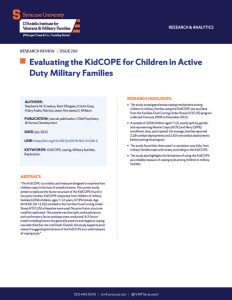Abstract:
“The KidCOPE is a widely used measure designed to examine how children cope in the face of stressful events. The current study aimed to replicate the factor structure of the KidCOPE found in four prior studies. KidCOPE responses from children of military families (2256 children, ages 7–12 years, 47.9% female, Age M=8.90, SD =1.62) enrolled in the Families OverComing Under Stress (FOCUS) at baseline were used. No prior factor structure could be replicated. The sample was then split, and exploratory and confrmatory factor analyses were conducted. A 2-factor model including factors for generally positive and negative coping was identifed; but not confrmed. Overall, this study supports prior research suggesting limitations of the KidCOPE as a valid measure of coping style.”
Research Highlights:
• The study investigated stress coping mechanisms among children in military families using the KidCOPE test and data from the Families OverComing Under Stress (FOCUS) program collected from July 2008 to December 2015.
• A sample of 2256 children aged 7–12, evenly split by gender and representing Marine Corps (61%) and Navy (39%) enrollment sites, participated. On average, families reported 2.28 combat deployments and 2.63 noncombat deployments before joining the program.
• The study found that there wasn’t a consistent way kids, from military families cope with stress, according to the KidCOPE.
• The study also highlights the limitations of using the KidCOPE as a reliable measure of coping style among children in military families.
Implications
FOR PRACTICE
This study underscores the importance of critically evaluating the tools we use to assess coping strategies, particularly in vulnerable populations
like children from military families. For practice, it suggests that clinicians and mental health professionals should exercise caution when using the KidCOPE measure to understand coping mechanisms in this demographic. Alternative assessments or supplementary methods may be necessary to gain a comprehensive understanding of how these children cope with stressors related to parental deployment and military life.
FOR POLICY
In terms of policy implications, this research highlights the need for more rigorous standards when it comes to selecting and validating assessment tools for vulnerable populations. Policymakers should consider allocating resources towards the development and validation of more accurate and culturally sensitive measures for assessing coping in children from military families. Additionally, policies should support the integration of these validated tools into clinical practice to ensure that children receive appropriate support and interventions tailored to their unique needs.
FOR FUTURE RESEARCH
For future research, this study underscores the importance of continued exploration into the development and validation of coping assessment tools specifically designed for children from military families. Researchers should focus on creating measures that capture the complexity and nuances of coping mechanisms in this population, taking into account factors such as age, developmental stage, and exposure to stressors. Moreover, longitudinal studies are needed to track changes in coping strategies over time and assess the effectiveness of interventions aimed at promoting resilience in military children. Ultimately, advancing our understanding of coping in this population will enable us to better support the mental health and well-being of children growing up in military households.

